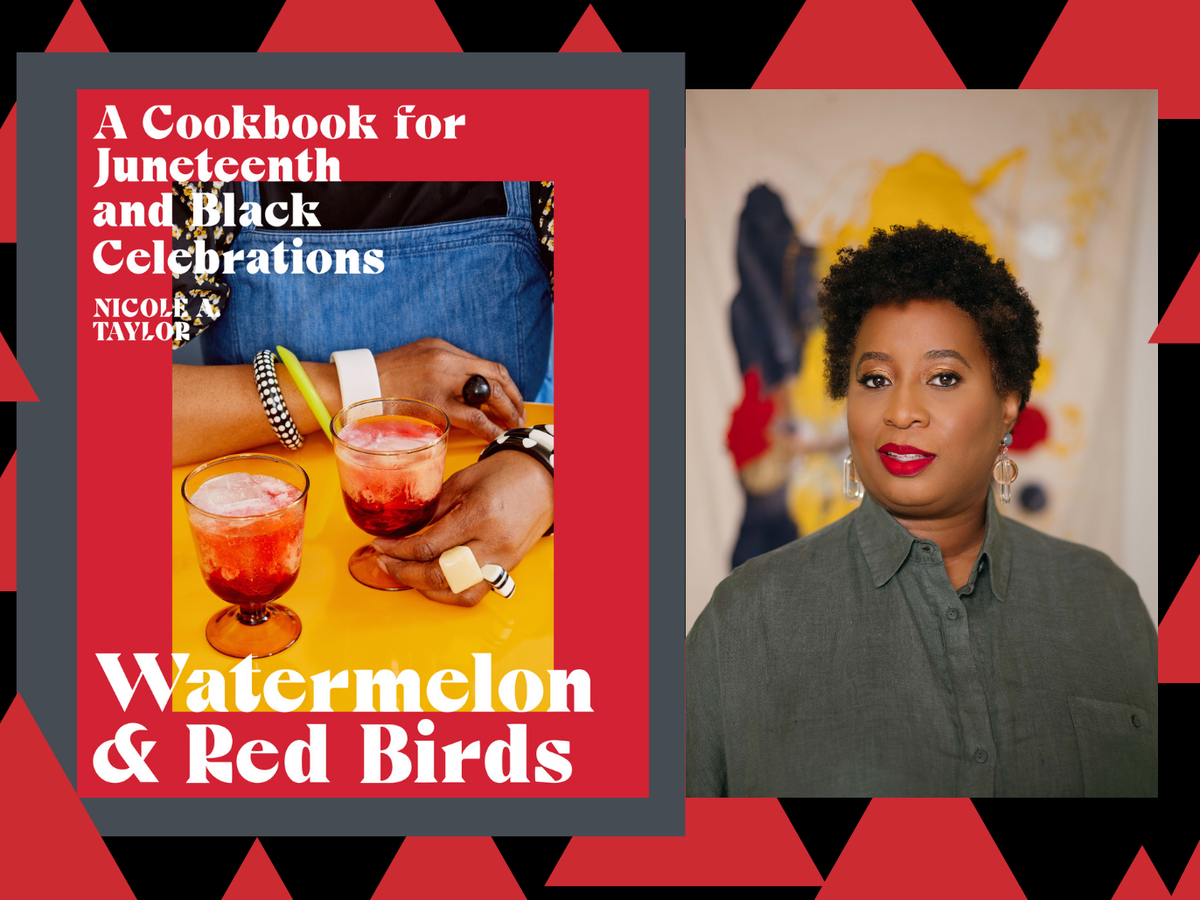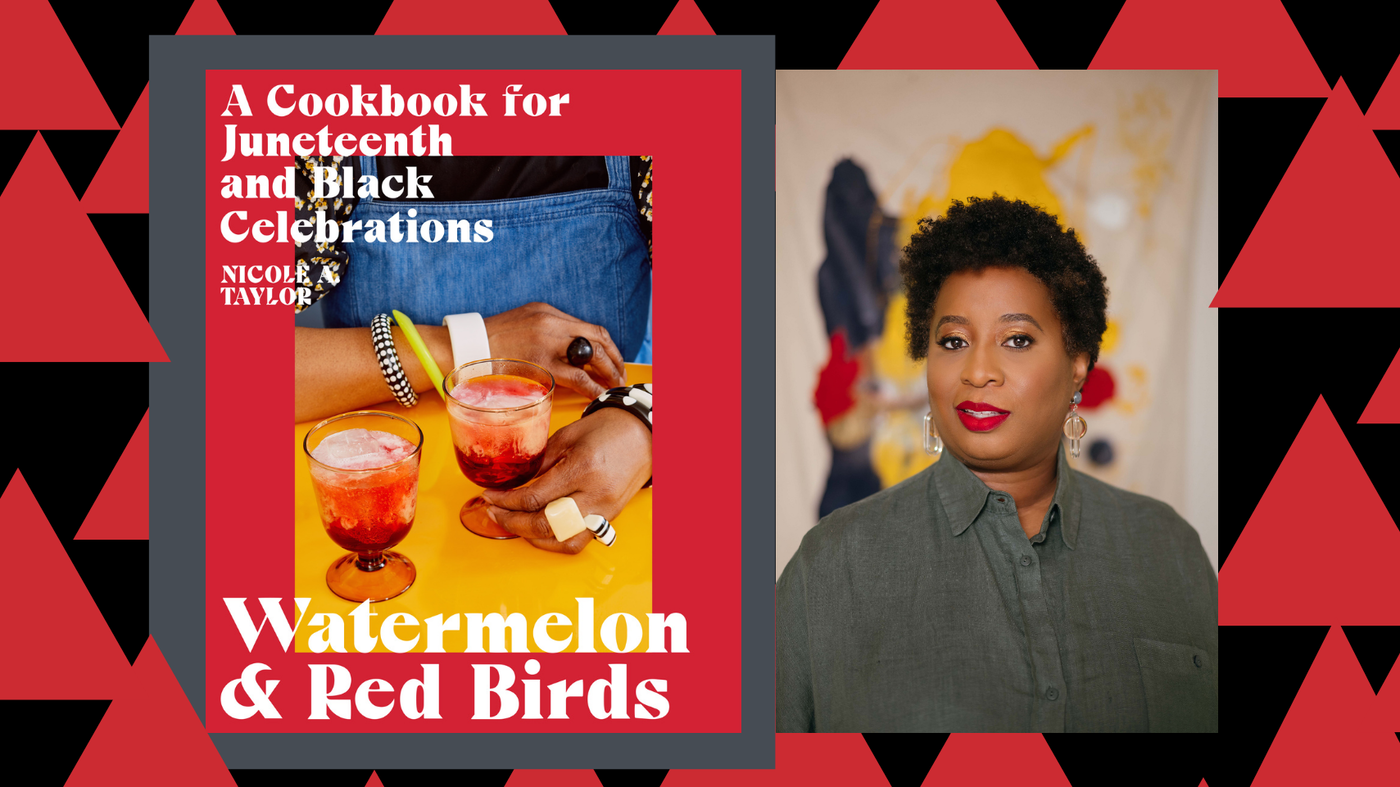Chef Nicole A. Taylor talks red birds, red drinks and Juneteenth: Code Switch: NPR
Chef Nicole A. Taylor next to her new cookbook, watermelon and red birds.
Kaylin James
Hide caption
toggle caption
Kaylin James

Chef Nicole A. Taylor next to her new cookbook, watermelon and red birds.
Kaylin James
2022 marks the second year that June 16 will be observed as a federal holiday – so it’s ripe to become another part of America’s summer calendar, like Memorial Day and July 4th and Labor Day. Translation? A day for mattress sales, limited edition merchandise, heavy drinking and – if you’re lucky – a proper day off.
But here at Code Switch, we’re big fans of recognition indeed Story. As such, we could not let the occasion pass without recalling what June 16th is all about and the traditions passed down from generation to generation long before much of the country even recognized the day.

So I spoke to Nicole A. Taylor. She describes herself as a “master chef” and is the author of Watermelon and Red Birds – one of the few June 16th themed publications that doesn’t make my skin crawl. In fact, it’s actually a very beautiful, very meaningful book that uses food as a lens to talk about the history of June 16 and other black celebrations.
Taylor has been writing about and cooking food for several decades. A proud native of Athens, Georgia, she garnered national attention with her 2015 release The Up South Cookbook– a collection of recipes and memories for people who, regardless of where they live, wanted to get to know the South.
In 2017, Taylor a New York Times Articles about Juneteenth foods. Not long after, her agent told her she needed to consider a book of recipes for June 16 — a suggestion Taylor initially rejected. “I didn’t feel like the right person to write this cookbook because I wasn’t born and raised in Texas,” she explained. “I’m a Southerner, but I’m not a Texan.”
But she is a collector and broker of food stories and foodways of the Black community. And, as she points out, blacks throughout the South have long, interconnected traditions of celebrating emancipation. So she decided to run with it. “Black Americans – all Americans really – needed a cookbook that was centered on black joy, founded June 19, 1865, that was a guide to gathering family and friends around the table.” And so, watermelon and red birds become reality.
This interview has been edited for clarity and length. For more information on Nicole A. Taylor, watch Sunday’s episode of the Code Switch Podcast.
Tell us about the title: What to do watermelon and red birds mean?
The watermelon is native to the African continent. For all Americans, it’s the fruit that cools you down during the hot summer months – it’s delicious, it’s juicy and it’s highly recognizable. So I wanted to make sure it would be part of the book. And red birds? Just thinking about why I added “Red Birds” to the title makes me smile. Because growing up, my mom used to tell me this story: every time you saw a red bird walking around you, she said there was someone in the family who stopped by to say hello. She said it symbolized happiness and that I should blow them a kiss. And so I knew that watermelon and red birds was the perfect title to honor the past, present and future.
In a way, we’ve been “Juneteenthed” to death in recent years, sometimes in seriously inappropriate ways. So I was wondering what do you think makes a recipe you want to serve on June 16th?
Very good question! I will justify my answer by reminding everyone that June 19, 1865 is the day more than 250,000 black Texans found they were free. That’s more than 2 years after President Abraham Lincoln signed the Emancipation Proclamation. So when I think about it, I think and research: what did black people eat in 1866? What was the traditional Black American or African American table? How did it look?
There are recipes based on African American food tradition. Could they be classics? Of course they can be classics. This can be things like barbecue, which we know are traditional Juneteenth fare — succulent juicy ribs, brisket, and even burgers can be traditional Juneteenth fare. And red drink.

But in this cookbook I have more than 75 recipes and they are not all traditional. They’re recipes rooted in African American cuisine, but they have my own twist that shows how I celebrated June 16th. That’s not to say I don’t have any classics on the table, but I just wanted to focus on that and give people permission to chart their own course, chart their own own traditions.
As you just said, Juneteenth started out as something that was well known in a certain community. In recent years, even before it became a public holiday, June 16 has become ubiquitous. I wonder what you think of this national interest on June 16th? I know there’s a school of thought that says, ‘It’s not yours, it’s ours. Others feel the same way should be a national holiday – and we should rejoice in it. What do you think?
Juneteenth has always been all over the United States of America. We know that during the Great Migration, many blacks left Texas for other cities. We know that people throughout the American South left their towns and cities and took their traditions with them. And so the Texans took their traditions with them. They went to places like LA. They went to places like Oakland, where you see one of the largest and longest running June 16th folk festivals in the country. Milwaukee is another place that has hosted a public Juneteenth festival since 1971. In Harlem and Brooklyn, Juneteenth celebrations have been going on for decades. There are Texans all over the United States, and if they can’t return to Galveston or Houston or Dallas, they will celebrate June 16th wherever they are.
And across the American South, blacks celebrated when they heard about freedom. It’s something that connects us. So I 100% debunk that other black people shouldn’t be celebrating June 16th. I think the most important thing is that we’re grounding and continuously telling the origin story of Juneteenth – that it’s a holiday that was born in Texas. And pay your respects to Galveston and the people of Texas by sharing the full story of how it came to be every time we talk about this new nationally recognized holiday.
What other black celebrations do you recall in this book?
I celebrate Kwanzaa. Another would be the block party – I’ve lived in Brooklyn for a long time and I love block parties! You tend to find block parties in black and brown neighborhoods, so that’s another black celebration in there. And as a proud HBCU graduate, college degrees are a perfect time to bring out all those foods you see on June 16th too. So this is another celebration to which I take my hat off watermelon and red birds.
Let’s get back to Red Drink for a moment, because for a lot of people that embodies June 16th. What should we remember about these drinks?
I want people to understand that there is a connection to black people around the world, especially if you look at Red Drink. I was in my late 20s – well over 20 years ago – when I realized that the red drinks I saw in bowls as a kid had a connection to West Africa. The national drink of Senegal is bissap – hibiscus soaked in water with spices and sugar. You can find a similar drink with a different name in northern Egypt. You can find the same drink in the Caribbean, where it is called sorrel.

Nicole A. Taylor’s take on a “Sweet Potato Spritz”
Beatrice da Costa
Hide caption
toggle caption
Beatrice da Costa
We are networked worldwide. And that’s what I want people to remember as they flip through this book: Yes, I’m focusing on Black American culture and Black food traditions and traditions around June 16th. but global we are connected.
The diasporic delicacy unites us?
One hundred percent!
On that note – do you have a favorite Juneteenth recipe that you would be willing to share with us?
One of my favorites, hands down, is in this Red Drink chapter. It’s the sweet potato spritz. It is reddish in color but the cappelletti, which is an aperitivo, is red. It has a sweet potato syrup that has all the essence of a sweet potato pie. So that’s me again, bringing black American food and putting my own spin on it. I take a roasted or boiled sweet potato and add warming spices — pretty much the same spices I or anyone else would put in a sweet potato pie. This syrup with the cappelletti, the vodka and the sparkling wine makes this nice, light summer drink that you can serve on June 16th. Really, you can serve it any day you want to feel joy – you want to feel the cheer. But this is easily one of my favorite recipes in the book. I will definitely have this on June 16th! (Recipe below.)

Nicole A. Taylor’s recipe for a Sweet Potato Spritz
Courtesy of Simon and Schuster
Hide caption
toggle caption
Courtesy of Simon and Schuster


Comments are closed.